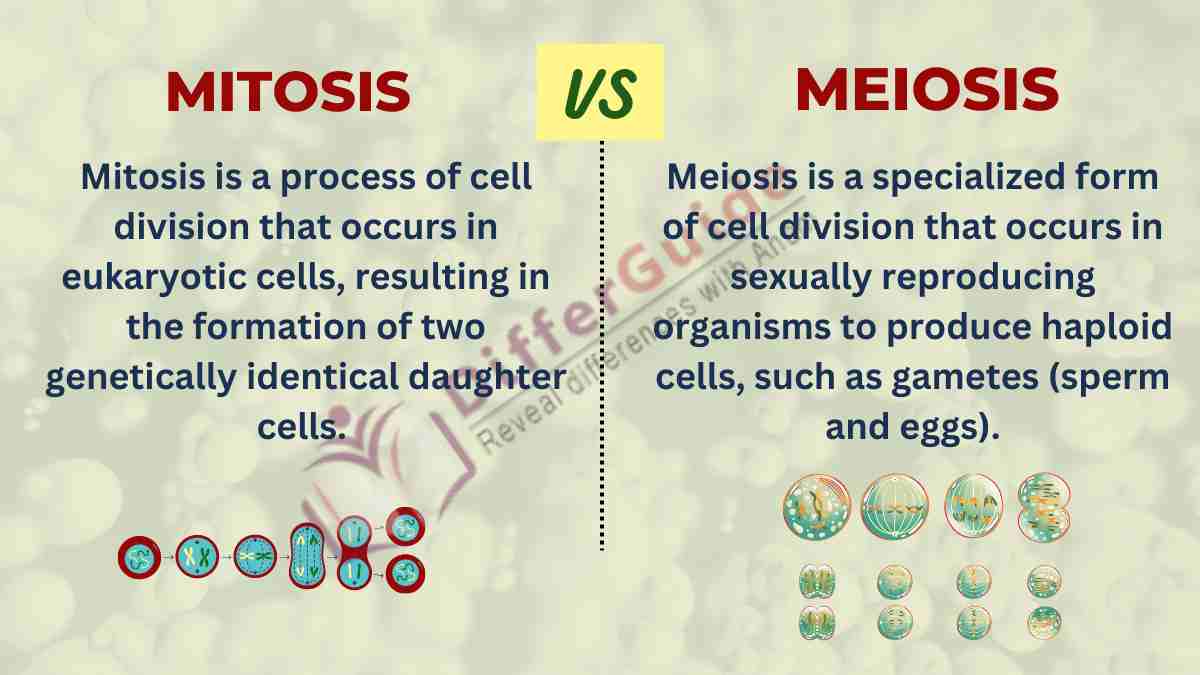The key difference between mitosis and meiosis is that mitosis results in the production of genetically identical diploid cells, while meiosis produces genetically diverse haploid cells for sexual reproduction.

What is Mitosis?
Mitosis is a process of cell division that occurs in eukaryotic cells, resulting in the formation of two genetically identical daughter cells. It is a fundamental process for the growth, development, and maintenance of tissues in multicellular organisms. Mitosis occurs in several stages and ensures that each new cell receives an exact copy of the parent cell’s genetic material.
What is Meiosis?
Meiosis is a specialized form of cell division that occurs in sexually reproducing organisms to produce haploid cells, such as gametes (sperm and eggs). It involves two consecutive divisions, known as meiosis I and meiosis II, which result in the formation of four genetically unique daughter cells.
The process of meiosis begins with a diploid cell, which contains two sets of chromosomes—one set inherited from each parent.
Mitosis vs Meiosis
The main differences between mitosis and meiosis are given below:
| Mitosis | Meiosis | |
| Definition | Mitosis is a type of cell division that occurs in somatic cells and it divides a cell into two identical daughter cells. | Mitosis is a type of cell division that occurs in somatic cell and it divides a cell into two identical daughter cells. |
| Purpose | Its purpose is to produce two genetically identical daughter cells, each with the same number of chromosomes as the parent cell. Mitosis is involved in growth, tissue repair, and asexual reproduction. | Its purpose is to produce haploid cells (sperm and eggs) with half the number of chromosomes as the parent cell. Meiosis is involved in sexual reproduction and creates genetic diversity. |
| Number of division | Mitosis involves a single division of the cell nucleus, resulting in two daughter cells. | Meiosis involves two successive divisions of the cell nucleus, resulting in four daughter cells. |
| Chromosome number | The daughter cells produced in mitosis have the same number of chromosomes as the parent cell. They are diploid cells (2n), meaning they contain a complete set of chromosomes (two sets in humans). | The daughter cells in mitosis have the same number of chromosomes as the parent cell. They are diploid cells (2n), meaning they contain a complete set of chromosomes (two sets in humans). |
| Genetic variation | Mitosis produces genetically identical daughter cells. There is no exchange or recombination of genetic material between chromosomes. | Meiosis promotes genetic variation through several mechanisms. Homologous chromosomes pair up and exchange genetic material (crossing over) during prophase I. This process leads to new combinations of genes. Additionally, during the second division, the resulting daughter cells may have different combinations of chromosomes due to independent assortment. |
| Occurrence | Mitosis occurs in various tissues throughout an organism’s life. It is a continuous process that replaces old and damaged cells. | Meiosis occurs only in specialized cells called germ cells, which are involved in sexual reproduction. It occurs during the formation of gametes (sperm and eggs) in animals and spores in plants. |
